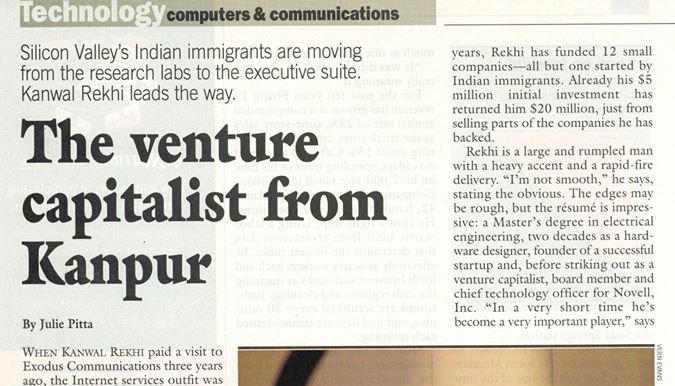Forbes did an article about me, titled “The Venture Capitalist from Kanpur” in their July 6, 1998 issue. Read below for the full text, or click here.
When Kanwal Rekhi paid a visit to Exodus Communications three years ago, the Internet services outfit was crammed into a 10-by-10-foot room packed with computers and people. The owner, an Indian immigrant named K.B. Chandrasekhar, was not the world’s most focused person. Rekhi, who is himself an immigrant from India and a graduate of the Indian Institute of Technology, Bombay, had been invited to invest in Exodus.
“I liked Chandra,” Rekhi recalls. “But there were things about his business plan I hated.”
Chandrasekhar and his colleagues were selling a smorgasbord of Internet-related products and services. Rekhi wrote a $200,000 check — on the condition that Exodus drop most of its services in order to concentrate on just a few. Six months later, with Rekhi’s assitance, Exodus was able to raise another $3 million.
Today Exodus counts Oracle Corp., CBS SportsLine and Hewlett-Packard among its customers. After an initial public offering earlier this year, the four-year-old company is valued at $556 million, netting Rekhi more than $10 million.
Rekhi, 52, made his first millions selling his own startup, Excelan, nine years ago. In recent years he has become the dominant investor in and sage of Silicon Valley’s affluent Indian community. Rekhi has funded 12 small companies in the past three years — all but one started by Indian immigrants. Already his $5 million initial investment has returned him $20 million, just from selling parts of the companies he has backed.
Rekhi is a large and rumpled man with a heavy accent and a rapid-fire delivery. “I’m not smooth,” he says, stating the obvious. The edges may be rough, but the rsum is an impressive one: a master’s degree in electrical engineering, two decades as a hardware designer, founder of a successful startup and, before striking out as a venture capitalist, a member of the board and the chief technology officer for Novell, Inc.
Silicon Valley is a networking kind of place anyway, and the number and prominence of Indian-born engineers and entrepreneurs constitute a kind of natural network. Rekhi is at the center of it. “Kanwal’s got a good nose,” says Yogen Dalal, an Indian-born venture capitalist. “When someone tells me Kanwal’s in on a deal, I take a look.”
More than a dozen Indian immigrants head prominent Internet startups.
Some have cashed in big: Hotmail cofounder Sabeer Bhatia pocketed probably $100 million when he sold his Internet mail service to Microsoft last year for an estimated $400 million.
In addition to holding impressive technical degrees, many of these Indians are honor graduates of the school of hard knocks. Rekhi’s Sikh family fled newly partitioned Muslim Pakistan with little more than the clothes on their backs, eventually settling in the Indian city of Kanpur. Rekhi came to the U.S. in 1967 to get a master’s degree in electrical engineering at Michigan Technological University. He was laid off from his first three jobs after graduate school. “The space program and the war in Vietnam were winding down. It was not a great time to be an engineer.”
In 1971 Rekhi packed up his wife and moved to San Jose, California for a position at Singer-Link, which made flight simulators. Eventually becoming bored, Rekhi left his job to join Zilog, Inc., a microprocessor outfit started by Federico Faggin, the engineer who coinvented the first popular microprocessor.
Still restless a year later, Rekhi and two Indian colleagues started Excelan to build add-in boards to connect desktop computers into a local area network. But as the company was preparing to go public in 1987 its backers asked Rekhi to resign as chief executive in favor of retired Hewlett-Packard executive Richard Moore. Apparently “I didn’t look the part,” Rekhi says. “It was explained to me that by hiring Dick, they were preserving my investment.”
That experience explains in part Rekhi’s determination to show that Indians can run companies as well as engineer them. After Novell bought Excelan, Rekhi joined Novell, but left when he was passed over for chief executive in favor of Robert Frankenberg. In earnest, he began networking with fellow Indians after he became president of Indus Entrepreneurs, an association organized to help South Asian entrepreneurs.
Not all of Rekhi’s companies have fared as well as Exodus.
Intellimatch, an Internet employment service, and Nirvana, which designed tools for Web site development, flopped. Now Rekhi has his hands full with CyberMedia, a promising venture that has become a victim of overexpansion. “It’s important that I straighten it [CyberMedia]
out,” he says. “My reputation is at stake.”


Comments are closed.